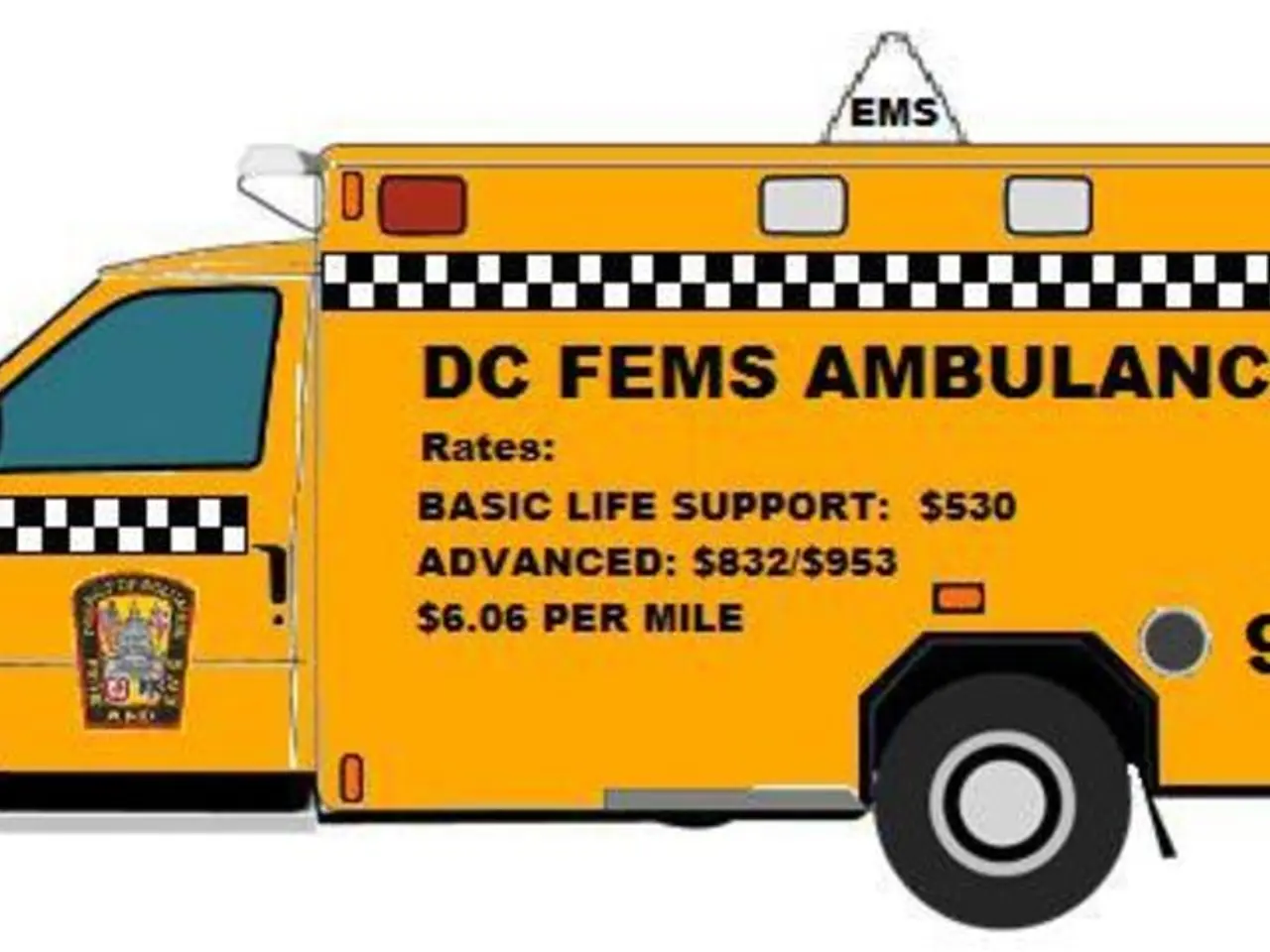Ventilators manufactured by Medtronic identified in two severe injuries and one fatality
Medtronic, a leading medical device company, has issued a Class I recall - the most serious level - for specific Newport HT70 and HT70 Plus ventilators due to life-threatening failures linked to two serious injuries and one death [1][2][3][5].
The primary cause of the recall is failures that could lead to ventilators not performing correctly, posing risks such as inadequate ventilation delivery, respiratory failure, inadequate gas exchange in the lungs, low oxygen saturation, hypoxia, or delayed treatment.
This recall is part of Medtronic's exit from the ventilator market announced over a year prior [1]. The affected models specifically are the Newport HT70, Newport HT70 Plus, and related Newport service parts [2][3].
Globally, the recall has been communicated widely with customers instructed to stop using the affected devices and await further instructions or replacements [1][3]. The exact global distribution details are not specified in the sources, but given Medtronic's market presence, the recall impacts multiple regions internationally [1][3].
In addition to ventilators, Medtronic has also recalled related respiratory and airway devices like Shiley Adult Flexible Tracheostomy Tubes due to risks of dislodgement causing airway obstruction [1][3].
What is a Class I Recall?
A Class I recall is the most serious type of recall issued by the Food and Drug Administration (FDA). It applies to situations where there is a reasonable probability that the use of these products will cause serious injuries or deaths [4].
Cause of the Failures
Medtronic identified two separate capacitors on circuit boards in its ventilators as the cause of the problems. When these capacitors fail, the ventilators can shut down or fail to trigger a shutdown alarm [2].
Reported Harm
There have been 63 medical device reports about the problem [2].
What Should Users Do?
Medtronic will not update the recalled ventilators to address the cause of the faults. Users are advised to stop using the affected devices and await further instructions or replacements from Medtronic [1][3].
The Food and Drug Administration (FDA) has shared Medtronic's press release about the recall on its website [3].
Summary
| Aspect | Details | |-----------------------|--------------------------------------------------| | Cause | Life-threatening failures in ventilator operation leading to injury and death | | Models Affected | Newport HT70 and HT70 Plus ventilators and related service parts | | Recall Level | Class I (most serious FDA recall level) | | Reported Harm | 2 serious injuries, 1 death | | Distribution | Global, Medtronic customers instructed to stop use pending further instructions | | Additional Medtronic Products Recalled | Shiley Flexible Tracheostomy Tubes for dislodgement risk |
This recall is considered critical due to the risk of serious harm or death associated with ventilator failures [1][2][3][5].
[1] FDA. (2022). Medtronic Recalls Newport HT70 and HT70 Plus Ventilators Due to Potential for Life-Supporting Ventilation to Cease. Retrieved from https://www.fda.gov/medical-devices/safety-communications/medtronic-recalls-newport-ht70-and-ht70-plus-ventilators-due-potential-life-supporting-ventilation-cease
[2] Medtronic. (2022). Medtronic Announces Recall of Newport HT70 and HT70 Plus Ventilators. Retrieved from https://www.medtronic.com/us-en/about-medtronic/news/press-releases/2022/08/medtronic-announces-recall-of-newport-ht70-and-ht70-plus-ventilators.html
[3] FDA. (2022). Medtronic Recalls Newport HT70 and HT70 Plus Ventilators. Retrieved from https://www.fda.gov/medical-devices/safety-communications/medtronic-recalls-newport-ht70-and-ht70-plus-ventilators
[4] FDA. (n.d.). Recall Classification. Retrieved from https://www.fda.gov/medical-devices/recalls-market-withdrawals-safety-alerts/recall-classification
[5] FDA. (2022). Medtronic Recalls Newport HT70 and HT70 Plus Ventilators Due to Potential for Life-Supporting Ventilation to Cease - En Español. Retrieved from https://www.fda.gov/medical-devices/safety-communications/medtronic-recalls-newport-ht70-and-ht70-plus-ventilators-due-potential-life-supporting-ventilation-cease-en-espanol
- The class of recall issued by the FDA for the Newport HT70 and HT70 Plus ventilators from Medtronic is the most serious, called Class I, which applies to situations where there is a reasonable probability that the use of these products will cause serious injuries or deaths.
- Medtronic identified two separate capacitors on circuit boards in its ventilators as the cause of the problems, and when these capacitors fail, the ventilators can shut down or fail to trigger a shutdown alarm.
- In addition to ventilators, Medtronic has also recalled related respiratory and airway devices like Shiley Adult Flexible Tracheostomy Tubes due to risks of dislodgement causing airway obstruction.
- There have been 63 medical device reports about the problems with the Newport HT70 and HT70 Plus ventilators.
- Users are advised to stop using the affected devices and await further instructions or replacements from Medtronic due to the critical nature of the recall, as the risk of serious harm or death associated with ventilator failures is high.
- The FDA has shared Medtronic's press release about the recall on its website and has instructed customers globally to stop using the affected devices and await further instructions.
- In regards to healthcare and health-and-wellness, the importance of device regulation and AI-driven analytics in medical-conditions management, patient care, therapies, and treatments cannot be overstated, as they ensure the safety and effectiveness of medical devices like ventilators.




